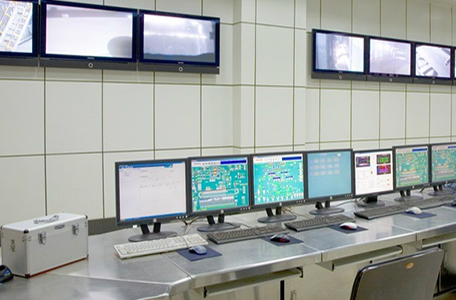HOME PRODUCTS Protection,Automation & Control Automation
-
SERVICES
 NEWS
NEWS  EVENT CALENDOR
EVENT CALENDOR  CONTACT US
CONTACT US 
-
PCS-9700 Automation System
PCS-9700 is a state-of-the-art automation system for substations, power plants and various industries. PCS-9700 is equipped with diverse advanced technologies and patents. It can be incorporated into various substations, from distribution level to Extra High Voltage (EHV) level. It integrates the applications of protection, control, Ethernet, IT and communication technologies based on international standards. Furthermore, PCS-9700 is fully compatible with the IEC61850 standard. The system adopts the layered distributed architecture with a bay-oriented and object-oriented structure, which is more reliable, extensible and easy to maintain.
NR also provides solutions that allow retrofit from the conventional substation to digital substation.

- Functions Compatibility System Architecture
-
Real-time data acquisition and processing
PCS-9705 Bay Control Unit (abbreviated as BCU) is applied to perform real-time data acquisition and processing.
Control operation, synchronism-check and interlocking
PCS-9705 BCU carries out control operations, synchronism-check and interlocking functions for Circuit Breaker (CB), Disconnector Switch (DS), Earthing Switch (ES), transformer tap changer and etc.
Communication with control center
PCS-9799 Station Manager works as a station communication manager, which collects, stores and maps signals of relays, measurement units, control units and other IEDs in the substation to higher-level systems such as control center (CC) and distributed control system (DCS).
PCS-9799 supports several protocols, such as IEC 61850, IEC 60870-5-101/104, IEC 60870-5-103, Modbus and DNP3.0.
Clock synchronization
PCS-9785 Satellite-synchronized Clock is usually used in Substation Automation System (SAS) to satisfy the time unifying requirements of protection relay, disturbance fault recorder and other IEDs.
A set of two PCS-9785 can form the "dual device dual network" redundancy strategy to provide a higher reliable and accuracy clock synchronization system.
Interfaces with third-party IEDs
PCS-9794 Protocol Converter works as a communication manager, which maps signals between IEDs and the local SCADA or protection management unit.
Besides most international standard protocols (including IEC 60870-5-101/104, NR private 103, Modbus, IEC 61850 and CDT), PCS-9794 also supports customized protocol development requirement for IEDs, such as DC batteries, earthing line selection device, etc.
PCS-9700 HMI software
Basic functions:
Graphic user interface
Remote control for CB/DS/ES & tap position
Real-time alarm
History event recording & retrieval
Topological analysis
Trending
Report & Statistics
Database management
Authority management
Graphic primitive management
Advanced functions:
Web
Anti-maloperation
Voltage and reactive power control (VQC)
Post Disturbance Review (PDR)
Data retransmission to Control Center (CC)
Protection management system
Protection management system is applied for the operation and management of protection relays, and it is also a decision-making system that can provide power grid fault analysis.
PCS-9700 automation system is completely compatible with the IEC61850 standard and has passed the IEC61850 conformance test, obtaining the level A certification issued by KEMA. NR has established its own IEC61850 level B test laboratory to confirm the standard compliance for all NR products.
NR IEDs support IEC61850-9-2 standard and process level Generic Object Oriented Substation Event (GOOSE) messages. Compared to conventional substations, the process bus based on optical fiber is used to replace cable connections between IEDs. Therefore, project construction time and cost can be reduced significantly.
PCS-9700 is comprised of three or four levels in hierarchical structure: Station Level, Network Level, Bay Level and optional Process Level.
For substations
PCS-9700 can be widely applied to various substations.
For power plants
PCS-9700 can be applied as Electrical Control and Management System (ECMS) and Networked Control System (NCS) in various power plants.
Station level
In station level, PCS-9700 HMI system provides supervision, control and management functions for operators in the substation. The man-machine interface is friendly and easy to handle. The structure is flexible and capable of extension. Furthermore, the operation mode is reliable. By applying the component technology, “plug-and-play” can be realized for software functions.
Network level
In network level, PCS-9700 supports single/dual networks based on distributed or ring structures. Balance flow control is used for duplicated network, so the reliability and the real-time performance can be ensured. By adopting IEC standard communication protocols or other private protocols, PCS- 9700 can communicate smoothly with equipment produced by other manufacturers.
Bay level
BCUs, protection relays, Disturbance Fault Recorders (DFR) and other IEDs locate in bay level. These devices can operate with long-term stability in severe environments, e.g.: high temperatures, high humidity or high electro-magnetic disturbance.
Process level (Optional)
In process level, fiber-optic network is adopted instead of conventional cable wiring. Therefore, workload is reduced, and substation operational period is extended.
For the process level of NR digital substation solution, Sampled Values (SV) and GOOSE are supported. Main components in process level are listed as below:
Electronic CT/VT (ECT/ECT) digitalizes the current/voltage signals and transmits them to various IEDs, e.g.: protection relays, BCUs, DFRs and etc.
Merging Unit (MU) gathers digitalized data from ECT/EVT and distributes them to various IEDs via the process bus or point-to-point optical fibers. Conventional CT/VT can also be connected to NR merging units.
Circuit Breaker Controller (CBC) acquires data from circuit breakers, and transmits then to various IEDs via process bus.
Local control panel realizes the local installation of IEDs.
Ethernet switches guarantees real-time data transmission in process bus.